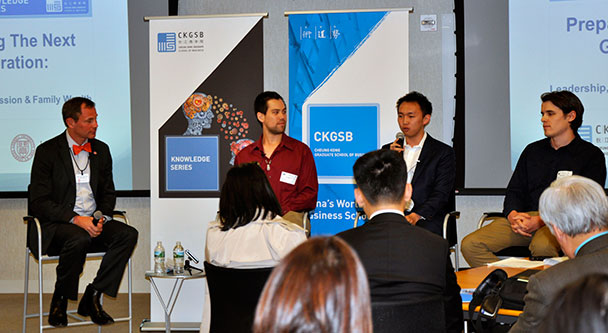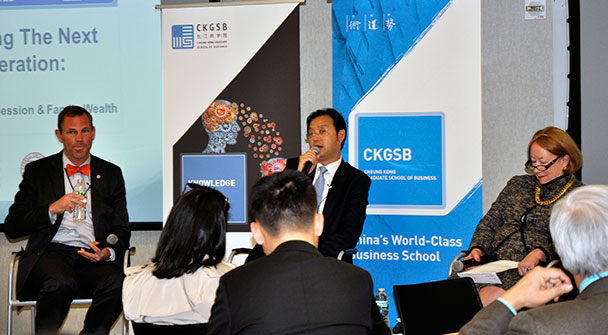With 90 percent of businesses in both the US and China considered family-owned, the importance of learning how these firms can best operate is essential to success. Experts and participants shared their experiences on the topic at a recent session at CKGSB’s New York office.
With family-owned businesses expected to represent nearly 40 percent of the world’s large enterprises by 2025, business operators everywhere need to know more about them. In China, the United States and Latin America, for example, 90 percent of businesses are considered family-owned. In India, the number is close to 98 percent.
In a public forum at CKGSB’s New York offices on April 19, experts from CKGSB and Cornell University, CKGSB’s partner in an innovative executive education program called Global Emerging Leaders in Family Enterprises (GEL), illuminated the growing importance of family businesses. GEL is designed for next-generation family business leaders from the US, China and elsewhere. The 2016 session of GEL will see participants spend two weeks, July 10-24, in New York City and Ithaca, NY, before flying to Beijing where they will learn to become leaders through interaction with successful entrepreneurs and global business leaders who will share experience and help create a global network.

Panel from L to R: Prof. Daniel G. Van Der Vliet, Executive Director,
Smith Family Business Initiative at Cornell; Calvin Smith, Head of Business Development,
Eastern America Trio Products; James Wan, current Fordham University student;
Houston Stebbins, art history graduate from Bard College
The forum, “Preparing the Next Generation: Leadership, Succession and Family Wealth,” highlighted the unique management challenges that family enterprises in the US and China face, stemming from the overlap of family and business issues. After an introductory session featuring some of the program’s directors, a panel discussion also took place with three second-generation family business leaders or entrepreneurs.
Some of the event’s highlights:
Q: What trends make the offering of GEL (July 10-24 in New York City, Ithaca and Beijing) so timely?
CKGSB Assistant Dean Zhou Li: Many family businesses in the US are not fully aware of the importance of the Chinese economy. They think the important market is still the US. In fact, in the US, you are influenced by the growth of the globalization of the Chinese economy. Chinese businesses and Chinese business people are going global worldwide. Many are already in the US. So Americans are impacted by what is happening in China. That is why it is important that American family business understand China better.
Prof. Daniel G. Van Der Vliet, Executive Director of the Smith Family Business Initiative at Cornell University: Twenty percent of the businesses in the Fortune global 500 are family owned. That is up from 15 percent from 2005. There’s a trend toward more family and private control in business. Fifty-eight percent of all small enterprises are looking toward emerging markets. So they are becoming much more opportunistic and much more global. Family enterprises will only grow in importance as we look at global economies. The more we can learn and understand from them is critical.
Q: Who should take CKGSB’s GEL program?
Mary Wadsworth Darby Senior Director at CKGSB Americas: This is a wonderful program for young professionals who may be second- and third-generation family members and for any young person seeking to meet business family members from China and the US. It’s a wonderful opportunity to network and to learn how to make succession decisions and other important choices concerning the future.

From L to R: Prof. Daniel G. Van Der Vliet, Executive Director,
Smith Family Business Initiative, Cornell University; Zhou Li, Assistant Dean, CKGSB;
Mary Wadsworth Darby, Senior Director CKGSB Americas
Q: How can GEL help participants address the real-world issues of business leadership?
Ms. Darby: One of the key questions that comes up in discussions about family businesses is what is the role of the next generation in the business? If you are selected as CEO, do you move toward remaining a private company or becoming a public company? If you become a public company, things become much more complicated. If it’s a private company, maybe the next generation will wish to be involved, but how do you allocate the stock, how do you carve out roles? These are the kind of issues you can talk about with your peers and professors in the GEL program. You also can discuss things with other business family members in China.
Prof. Van Der Vliet: We build a global network of your peers who come from various backgrounds. Building that network helps answer some questions better than anyone in academia, better than Mom or Dad, or better than any lawyer or accountant.
Q: What are some unique qualities of family enterprises?
Prof. Van Der Vliet: When the family is aligned they can actually be very innovative, very flexible, very responsive to the marketplace. When a family is not aligned, it represents a challenge for that business to move forward and to be responsive. And it also could eventually mean the business itself can be challenged to continue. Inherently we trust family or at least we want to trust family. In this economy that is growing more complex, there is something inherently trustworthy about family business.
Q: What are the implications of China’s globalization for family/private businesses?
Dean Zhou: Chinese businesses are going global at a very fast rate. An example is Fosun International Limited, an international conglomerate and investment company whose businesses cover industrial operations, investment, asset management and insurance with many subsidiary companies in each business. Their chairman and CEO are CKGSB alumni. Companies like Fosun can be considered family business because they are privately owned. It used to be State Owned Enterprises that were leading outbound direct investment, buying mines and resources. Now it is our alumni in the private sector who are taking their companies global.
Prof. Van Der Vliet: In China, the approximate age of most Chinese CEOs is approximately 50 years old. CKGSB research showed that 80 percent of the next generation has no intent of returning to that enterprise. Family enterprise is not always about returning to the family business. It’s about pathways for success for those individuals. Five to 10 years down the road, we often see individuals realizing that going back to the family business is not such a bad idea. The advantages of family enterprises are that they tend to think with a more long-term perspective, they invest in more patient capital, they tend to invest more in their employees, and they are more prone to making values-based decisions. They also are more tied to their local communities and practicing philanthropy.
To find out more about the Global Emerging Leaders in Family Enterprises (GEL) program, please click here.